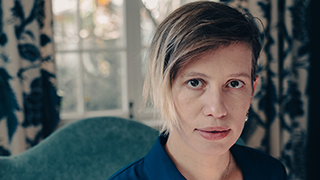A Coffee Chat with CommArts’ M.A. in Communication Program Director - Seton Hall University
Monday, November 22, 2021

In parallel, Tsuria has also taken on a new role supporting the College as the recently appointed Program Director of the M.A. in Communication program. During her three-year appointment, Tsuria will focus on strategically diversifying the program's course offerings, broadening its reach and increasing innovation while keeping student and faculty interests in mind.
"Dr. Tsuria's scholarly publications, steadfast dedication to her students' success and overall tenacity for excellence will contribute to the continued growth of our M.A. in Communication program," noted Assistant Dean Ryan Hudes, Ph.D. "Since arriving to the University, Dr. Tsuria's student-focused commitment has increasingly strengthened the program's curriculum and its notoriety across regional, national and international disciplinary venues, and we look forward to the program's continued success as part of her leadership as Program Director."
To shed light on her role, Tsuria sat down with us to discuss her vision for the program and how she is using her background and first-hand knowledge of the College to foster its advancement. Here's what she had to say:
You joined Seton Hall University back in August 2017 after finishing your doctorate at Texas A&M University – how quickly time has flown! What are some key learnings from the past few years that you hope to apply as program director?
First of all, and perhaps most importantly, I've learned to be open and ready for change. One of the major takeaways from the pandemic is that plans are constantly changing – which is also very true for the field of communication! Communication norms, tools and behaviors are constantly evolving, so we never stop learning and researching.
Second, I've seen the strength of the Seton Hall community. People here care deeply about the University, and I hope to create an even stronger community for our graduate students. One plan is to invite more undergraduate students to our program. For example, we are planning to offer a cross-level course: meaning, a course that both graduate and excelling undergraduate seniors can take.
More personally, I've also learned the value of mentorship. Moving from being a graduate student myself to becoming a mentor to others has shown me how much we can lift each other and our students up if we are invested in each other's success.
I hope to apply all of these learnings to the program, its students and staff.
With that in mind, let's talk about your appointment. What is your goal for the M.A. in Communication program as the director?
Our vision is to become a recognized and sought-after graduate program at the regional, national and international levels that has a nimbleness to meet students' complex academic and professional needs by tying practice to theory in fields related to communication. Specifically, I see us building on our program's current philosophy and achievements, while constantly evolving as the world around us changes.
That philosophy is centered on three elements: the student, the work, the world. We are student-focused per excellence, meaning that every course we teach, every assignment we create is crafted to bring the best out of our students. We adjust our courses based on student needs and feedback while mandating academic success. That means encouraging them to pursue academic and professional standards of researching, writing, speaking and crafting solutions to various communication challenges.
From a global perspective, our program seeks to tie academic work to real-world needs and problems. We support our students in achieving ground-breaking, socially and community-focused research projects that have been identified by our learners and seek to respond to world communication challenges.
You mention supporting students, which has been ongoing through strategic updates on the curricular level for the program including the creation of the Communication Portfolio course. How have those types of changes influenced your planning and vision for the program?
Change is in this programs' "blue blood" and philosophy – it's inspired by shifting priorities in the world, workplace and students. For example, the Communication Portfolio course was crafted because more and more workplaces require experience. As a result, we created an academic environment that helps students create more content they can use to showcase their skills.
Another example is when we revised the previous M.A. in Public Relations (PR) program from a degree to a concentration within the M.A. in Communication program. Why? Because more PR positions require practicing professionals to understand communication in a broader context; to understand digital media; to possess organizational skills and to have research capacities. Consequently, our program evolves based on needs not only reactively, but also proactively.
Outside of the program, what is the most rewarding aspect of your role as program director?
What excites me the most is the ability to more fully mentor our students and play a more involved role in the student recruitment and application process. For me, each student is like a story. I love seeing our students develop and discover their passion, increase their skills and find their voice and vocation.
About the College of Communication and the Arts
The College currently offers graduate-level programs in Museum Professions and Communication, including the opportunity to pursue a unique area of study, including
options in Public Relations, Digital Communication/Communication Technologies and
Communication in Organizations. In addition, four dual-degree options, including three
accelerated master's/B.A. programs and a dual M.A. degree with the School of Diplomacy
and International Relations are offered.
For more information about Graduate Studies within the College of Communication and the Arts, please contact Dr. Ryan Hudes.
Categories: Arts and Culture






